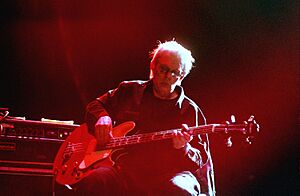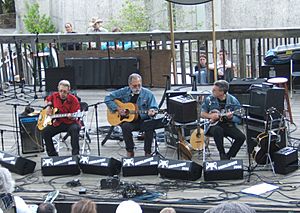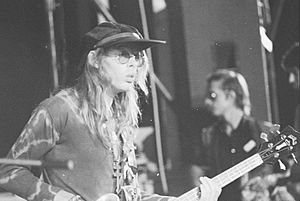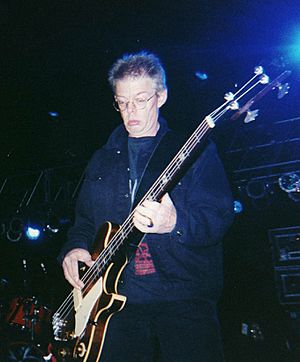Jack Casady facts for kids
Quick facts for kids Jack Casady |
|
|---|---|

Casady playing his signature bass with Hot Tuna in 2005
|
|
| Background information | |
| Birth name | John William Casady |
| Born | April 13, 1944 Washington, D.C., U.S. |
| Genres | Rock, blues |
| Instruments | Bass guitar |
| Years active | 1964–present |
| Associated acts | Jefferson Airplane, Jefferson Starship, Hot Tuna, Moonalice, Jimi Hendrix, SVT, Roky Erickson |
John William Casady, born on April 13, 1944, is a famous American bass guitarist. He is best known for playing in two important bands: Jefferson Airplane and Hot Tuna. Jefferson Airplane was a very popular band from the "San Francisco Sound" music scene. Their songs like "Somebody to Love" and "White Rabbit" were big hits in 1967 and 1968. In 1996, Jack Casady and the other members of Jefferson Airplane were honored in the Rock and Roll Hall of Fame.
Contents
Early Life and Musical Start
John Casady was born in Washington D.C. His parents were Mary Virginia and William Robert Casady. His mother was even related to the famous aviator Harriet Quimby.
Jack first played lead guitar in a rhythm and blues band called The Triumphs. This was in the Washington D.C. area. During his high school years, he switched to playing the bass guitar. Even when he was too young, he played in clubs in Washington D.C. He backed up many artists, including Little Anthony and the Imperials.
Joining Jefferson Airplane (1965–1972)
Jack Casady became the bass player for Jefferson Airplane in September 1965. His high school friend, Jorma Kaukonen, who was the band's lead guitarist, invited him to join. Jack took the place of the band's first bassist, Bob Harvey.
Casady changed how the bass guitar was used in rock music. He didn't just play simple background notes. Instead, he explored new melodic ideas. These ideas came from the song's rhythms and chords. His unique style was clear on the band's first album, Jefferson Airplane Takes Off (1966). You can hear it on songs like "Let Me In."
On the live album Bless Its Pointed Little Head (1968), Casady's special "walking line" bass style really shined. He used a Guild Starfire bass with a Versatone amplifier. This gave his bass a unique, growling sound. The song "The Other Side of This Life" is a great example of his playing. Later, he used a custom-made Alembic bass. Fans even called him "God" because of his amazing sound.
Other great bass performances by Casady include the hit song "White Rabbit" (from Surrealistic Pillow, 1967). He also played on "Rejoyce" and "Watch Her Ride" (After Bathing at Baxter's, 1967). His playing on these songs often mixed jazz and raga styles with rock music. In live shows, Casady often played a long, improvised solo in the song "The Ballad of You and Me and Pooneil." Each night, his solo was different and often amazing.
While with Jefferson Airplane, Casady also played with other musicians. He performed live with Jimi Hendrix in 1968. He also played bass on Hendrix's song "Voodoo Chile" from the Electric Ladyland album. He sometimes played with other San Francisco bands like Grateful Dead and Country Joe and the Fish. He also produced Jorma Kaukonen's first solo album, Quah, in 1975.
Hot Tuna: A Long-Lasting Partnership

In 1969, Casady and Kaukonen started a new band called Hot Tuna. They still perform together today. Over the years, Hot Tuna has changed its style many times. They have played acoustic blues, electric boogie, and even heavy rock. Casady is great at playing both acoustic and electric music.
His solo on "Candy Man" (from Hot Tuna's First Pull Up, Then Pull Down, 1971) shows his ability to play a melody, not just rhythm. On the 1972 album Burgers, his playing is very detailed. The song "Water Song" features what Casady calls "lead bass." In "Sunny Day Strut," his bass plays against Kaukonen's lead guitar. When Hot Tuna became a power trio in the mid-1970s, Casady's custom Guild Flying V bass became his signature instrument.
Other Musical Projects
In the late 1970s, Hot Tuna took a break. During this time, Casady helped start a modern rock band called SVT. He played in a New Wave style, which was very different from Hot Tuna and Jefferson Airplane. He even taped his fingers together to make himself play simpler bass lines.
In the 1980s, Casady joined former Airplane members Paul Kantner and Marty Balin in the KBC Band.
Jefferson Starship
In 1992, Jack joined Paul Kantner's new version of Jefferson Starship. He played on their albums Deep Space / Virgin Sky and Windows of Heaven. He later left the band in 2000. However, he appeared on the 2008 Jefferson Starship album, Jefferson's Tree of Liberty.
Dream Factor Solo Album
Jack Casady is not a singer and doesn't write many songs. But in June 2003, he released his first solo album, Dream Factor. He worked with Greg Hampton to produce it. Many other musician friends helped him on the album.
Today, Casady still performs with Hot Tuna. He also teaches bass workshops at Jorma Kaukonen's Fur Peace Ranch in Ohio. He helped design the "Jack Casady Signature Bass" with Epiphone. It's a special hollow-body electric bass.
Moonalice
In 2007, Casady joined a new band called Moonalice. Other members include Pete Sears and G. E. Smith. Their first studio album, Moonalice, came out in April 2009.
Jack Casady's Musical Approach
Casady is known for the powerful sound of his bass playing. He says that tone is the most important quality for an electric bassist. He believes that "Tone is your signature as to who you are." He feels that the music is built around the tone. It's not just about the notes or the playing style. He says a great musician's unique sound comes from their tone.
Discography
Jack Casady
- Dream Factor (2003)
Jefferson Airplane
- Jefferson Airplane Takes Off (1966)
- Surrealistic Pillow (1967)
- After Bathing at Baxter's (1967)
- Crown of Creation (1968)
- Bless Its Pointed Little Head (1969)
- Volunteers (1969)
- Bark (1971)
- Long John Silver (1972)
- Thirty Seconds Over Winterland (1973)
- Jefferson Airplane (1989)
- Live at the Fillmore East (1998)
- Sweeping Up the Spotlight (2007)
- The Woodstock Experience (2009)
Hot Tuna
- Hot Tuna (1970)
- First Pull Up, Then Pull Down (1971)
- Burgers (1972)
- The Phosphorescent Rat (1974)
- America's Choice (1975)
- Yellow Fever (1975)
- Hoppkorv (1976)
- Double Dose (1978)
- Pair a Dice Found (1990)
- Live at Sweetwater (1992)
- Live at Sweetwater Two (1993)
- Live in Japan (1997)
- And Furthurmore... (1999)
- Steady as She Goes (2011)
- Bear's Sonic Journals: Before We Were Them (2019)
Jefferson Starship
- Deep Space/Virgin Sky (1995)
- Windows of Heaven (1999)
Moonalice
- Moonalice (2009)
Michael Falzarano
- A Kaleidoscope Christmas (2020)
See also
 In Spanish: Jack Casady para niños
In Spanish: Jack Casady para niños
 | Victor J. Glover |
 | Yvonne Cagle |
 | Jeanette Epps |
 | Bernard A. Harris Jr. |



